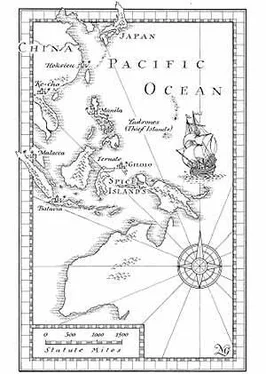‘I will only leave Pehko if that woman can come with me,’ Hector told him.
The Malaccan shrugged. ‘I am not accustomed to female passengers on my ship. But if the Sultan says she may travel with you, then naturally I will follow His Majesty’s wishes.’
Hector’s elation at the victory over the Sugala had faded during the journey back to Pehko. It had been replaced by a premonition that he would face exactly the same problems he’d left behind. ‘Even if Maria is allowed to leave,’ he said, ‘I don’t know where we’d find the money to pay you for our passage.’
Musallam waved the objection aside. ‘I expect no fee. I hear the Sugala agreed that the skins from God’s Birds will be sold only through Pehko. So in future I need only come to this port to collect the harvest. That puts me in debt to you.’
The crowd was beginning to thin out. They had succeeded in getting the brass cannon up the slipway and were attaching drag ropes to the gun. Clearly they were intending to shift it up to the Kedatun sultan. Mansur had hurried off to the palace immediately after landing, just as Hector was hoping to speak with him about Maria. But the chamberlain hadn’t come back. Hector was beginning to feel that he and his companions were being discarded now their usefulness was over.
Musallam Iskandar tried to cheer him up. ‘Why don’t you and your colleagues stay aboard my vessel tonight? Tomorrow we can go together to the palace to attend the celebrations, and there maybe you will be able to speak to your woman.’

HECTOR PASSED a restless night aboard the jong and was already on deck and waiting to go ashore when a drizzly, grey dawn heralded an overcast day well suited to his sombre mood.
‘This rain is a sign the monsoon will soon be here,’ commented Musallam, wiping his pockmarked face as he joined Hector. The trader was wearing a fresh white gown and a neat black and white checked turban, which gave him a formal appearance. ‘It will bring the wind we need if we are sailing for the Straits.’
The dugout that served as the jong’s tender was already alongside. As soon as Jacques, Jezreel and Dan appeared, all five of them were paddled ashore, and together they began to climb the path leading to the palace. Around them the people of Pehko were hurrying up the hill. They were dressed in their best clothes – crisp sarongs and newly laundered shirts, head-cloths in blue and red. By comparison Hector felt he and his friends were pretty shabby in the threadbare shirts and breeches they’d been wearing for the past eighteen months.
By the time they reached the top of the hill, the rain had stopped and the sky had begun to brighten. Hector noted that the two lantaka had already been returned to their customary places in front of the palace. Between them stood the brass five-pounder, its muzzle pointing out over the town and decorated with a garland of orange flowers.
A line of the Sultan’s subjects was filing respectfully through the palace doors, which stood open to receive them. Judging by the air of suppressed excitement, invitations to visit the palace were rare.
But when their little group reached the doorway, a doorkeeper resplendent in a helmet decorated with plaques of turtle shell stopped them. He waved the Malaccan trader on through, but after a disdainful look directed the others to a side entrance. They found themselves in a cramped vestibule, where palace servants explained with sign language that the visitors could not go farther unless they changed out of their soiled garments. They were offered loose trousers of fine white cotton, long-sleeved shirts in the same material and sashes of violet silk.
‘I’m not surprised. This smells of grease and cooking,’ said Jacques, wrinkling his nose as he unbuttoned his grubby shirt and pulled on the fresh clothes. ‘How do I look now?’ He pirouetted in his new get-up. ‘I feel that I am about to go on stage in an opera.’
‘In the role of a clown,’ suggested Jezreel, as he struggled to fasten the buttons of his new shirt, which was too small for him.
Self-conscious in their new costumes, they were ushered through a door that gave directly on to the main reception hall of the palace. Hector blinked with surprise. The gloomy cavernous chamber of his earlier visit had been transformed. Great swags of yellow, pale-blue and rose-pink muslin were suspended from the bamboo poles wedged between the rafters. The shutters along the walls had been thrown open to let in light and air. Fresh matting had been laid on the boards, the wooden pillars that held up the roof were wrapped in bright-green palm fronds, and small spirals of smoke rose from incense burners, which gave off a heady, sweet perfume. A band of a dozen musicians in yellow and grey gowns played a melody on gongs, flutes and drums.
Three or four hundred people were gathered in the room. Most were men, but here and there Hector saw women demurely dressed, some with black veils, others with shawls over their heads. He looked among them hopefully, trying again to find Maria, but was disappointed. The crowd stood in a hollow square facing the Sultan’s divan at a respectful distance. The royal couch with its red velvet cushions had been raised on a low plinth covered with brocaded silk. The old man himself was nowhere to be seen, but he was obviously expected because many of the courtiers Hector remembered from his previous audience stood ranged on each side of the divan. Instead of their black pyramid caps, they were wearing towering headdresses made from the feathers of God’s Birds.
It took Hector a moment to recognize Mansur among them. The tall, thin chamberlain was standing next to the empty divan, and his headdress was a particularly magnificent arrangement of black and orange-yellow plumes. Hector was considering whether to walk across boldly and ask about Maria when the band stopped playing and there was the clash of a large gong. All the courtiers turned and faced to their left, the plumes of their headdresses bobbing and nodding in a ripple of colour. The muslin curtains had been drawn aside, and the old Sultan came hobbling through the gap. Immediately behind him stalked an attendant holding up a ceremonial parasol of yellow silk. At the old man’s right hand a courtier carried the silver betel box, and to his left another attendant held a silver spittoon. Slowly they advanced into the room while the crowd hushed. The old man wore a pure-white sarong over a pair of black trousers, a broad belt of red silk, and a tight, long-sleeved jacket of black velvet slashed with gold and a high stiff collar, which failed to hide his thin neck with its folds of wrinkled skin. On his feet were finely worked purple slippers. Instead of a feathered headdress he wore a head piece of gold filigree.
He reached his divan and lowered himself stiffly on to the cushions. The attendants placed the betel box and spittoon beside him, bowed and withdrew. The servant with the parasol took up position directly behind his master. The Sultan slowly turned his head, blinking his red-rimmed and rheumy eyes as he surveyed his subjects. He reminded Hector of one of the tortoises he’d seen so long ago on the Encantadas.
The gong sounded again, a gentler stroke, and this time it was Prince Jainalabidin who entered. The boy was dressed in the same costume as his father, but bare-headed. Behind him came an attendant bearing a smaller ceremonial parasol. The boy took his place standing on the step below his father, at his right hand.
A short pause was followed by a tapping of drums and the sound of a stringed instrument that reminded Hector of a viola. The crowd parted to allow a troupe of a dozen women and girls to glide into the open space before the Sultan. They were dressed in matching costumes – sarongs of flowered red silk and short green satin jackets fastened with buttons of shell. On their wrists and ankles they wore an array of gold bangles, and they kept short shawls of green gauze draped over their heads. With their gaze demurely on the ground before them, they performed a slow-paced sinuous dance, gyrating gracefully, moving their hands and arms, and every now and again holding a pose whenever a small gong was struck.
Читать дальше









